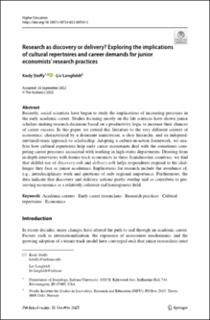Research as discovery or delivery? Exploring the implications of cultural repertoires and career demands for junior economists' research practices
Original version
10.1007/s10734-022-00934-5Abstract
Recently, social scientists have begun to study the implications of increasing pressures in the early academic career. Studies focusing mostly on the life sciences have shown junior scholars making research decisions based on a productivity logic to increase their chances of career success. In this paper, we extend this literature to the very different context of economics, characterized by a dominant mainstream, a clear hierarchy, and an independent/small-team approach to scholarship. Adopting a culture-in-action framework, we analyze how cultural repertoires help early career economists deal with the sometimes competing career pressures associated with working in high-status departments. Drawing from in-depth interviews with tenure-track economists in three Scandinavian countries, we find that skillful use of discovery-talk and delivery-talk helps respondents respond to the challenges they face as junior academics. Implications for research include the avoidance of, e.g., interdisciplinary work and questions of only regional importance. Furthermore, the data indicate that discovery and delivery notions partly overlap and so contribute to preserving economics as a relatively coherent and homogenous field.
